- Home
- Piers Anthony
Rings of Ice
Rings of Ice Read online
Rings of Ice
Piers Anthony
Zena and the boys went ice-ring planing,
Boys fouled up and Earth got a raining!
Gus and Thatch were desperately trying to drive the big mobile home up into the mountains, high above the floods rapidly drowning out the rest of the world. They even had some crazy notion about saving civilization from the waters—which was why they took along uptight Zena - who knew far more than she was telling about why that vast canopy of ice had suddenly surrounded Earth—and voluptuous Gloria—who turned out sometimes to be a man and sometimes a woman as well. And then they picked up Karen, and Floy, and Dust Devil, and Foundling—two latterday Noahs in a motorized ark. The trouble was, their little community wasn’t the only one frantically trying to find dry land, food and fuel. And seeing robbery, looting, murder and cannibalism were now looked on as legitimate means of survival, the struggle for life was apt to become a little vicious at times.
Rings of Ice
by Piers Anthony
Chapter 1: Rain
Noon—but the depth of swirling cloud blanked out any suggestion of the sun and made the air chill. She stood forlornly on the approach to the Interstate highway, knowing the chances were fifty-fifty that any car that stopped for her would mean trouble for a lone young woman. But trouble or no, she had to get a ride; time was running out.
She saw the small bus as the first fat drops of rain slanted down. The vehicle was moving slowly around the loop of the approach, feeling its way. There was no reason to assume it was slowing for her.
She forced her eyes off it, watching the rain smash into the dry dirt embankment beyond the road. The huge drops actually excavated little craters. Meteorologically, she knew, this was known as rain-drop blast, and it could be a substantial if little-known source of erosion. The construction company should either have paved the embankment or seeded it with grass. Perhaps that had been scheduled for next week. As it stood, a few good storms would carry down so much earth that the job would soon have to be done over.
In fact, one good storm would wash it out. This one. Not that it mattered. The world as she knew it was coming to an end.
The downpour developed so rapidly that by the time the bus pulled abreast of her she was drenched. But the vehicle stopped, it stopped!
It was not a bus after all, or a van, but a motorized trailer, a camper, a motor home. There was a massive “W” on its side, with a painted line trailing all the way to the rear. Winnebago—she had seen them on the road before, but never been inside one. Its door was set back a few feet, in the side, and it had bus-like windows. Privately owned—and surely by a wealthy family. Well, any port in a storm—especially this storm!
The door opened. She climbed in. Her wet skirt caught at her thighs, making the ascent awkward, and she was dripping water all over the fine shag carpeting inside.
A handsome, hearty man stopped looking at her legs long enough to give her a hand up. She stiffened, but reminded herself that she was the one begging the favor of a ride. It ill behooved her to antagonize anyone at the outset.
“Hi!” the big man said. “I’m Gus Gunter.” He gestured to his companion, the driver. “This is Thatch. Thatcher Zane. You?”
“Zena Emers,” she said, looking about. The interior was elegant—an amazing contrast to the stark metal exterior. There was a dinette opposite the entrance, with a map of North America set into the plastic table surface. The upholstery was in dark leatherette, looking expensive and new. The carpeting extended all the way down the central hall to the back.
It was not the sudden luxury that dismayed her so much as the human situation. With every vestige of her clothing plastered against her body, she was suddenly thrust into a traveling bachelor apartment Maybe she would be better off in the rain.
“Get it moving, Thatch,” Gus said. Had he read her mind?
The driver shook his head dubiously. He was a medium-small man with heavy-lensed glasses that distorted his pale brown eyes, and he had a moderately receding chin. His face was scarred as if by smallpox or childhood acne. His hairline was drawing back from his forehead, though he could not be over thirty. As men went, wholly unimpressive.
“I don’t know,” Thatch muttered. “She’s all wet, and the visibility—” His voice was somewhat nasal, in contrast to the chesty timbre of his handsome friend.
“You worrying about the visibility outside—or inside?” Gus demanded. It might have been a joke, but he wasn’t smiling, and Zena herself was all too well aware of her involuntary exposure. But how did one buy a raincoat or umbrella while hitchhiking broke? “I’ll take care of Miss Emers,” Gus continued. “It is Miss?”
She nodded reluctantly. She might have insisted on Ms, but would not lie about Mrs—and doubted that it would have made any difference to this pair.
“So you get this crate going before it stalls out,” Gus finished.
The driver should have bridled at the tone, but Thatch only shrugged and eased the motor into gear. The beat of rain on the windshield intensified as the vehicle picked up speed.
Gus put his big familiar hand on Zena’s elbow. “There’s clothing in back. Maybe some’ll fit you. Don’t worry about the rug; it’ll dry.”
“Thank you, no,” she said, shaking him off. Already it was beginning! “Where’s the next stop?”
“No next stop,” he said. “You’re staying with us. Now come on back.” And once more that hand landed, this time on her wet shoulder.
She rammed a stiffened knuckle into his armpit and followed it up with a wrist grip that sent him twisting to the floor. “Thatch!” he cried as he went down, crashing against the dinette table so that it clattered to the floor. He sounded like a lost child.
Thatch brought the bus to a skidding halt that made Zena grab for the little sink. There was an entire kitchenette along this wall, including a range and a refrigerator, but she did not have the opportunity to appreciate it. She wanted to get out—but now she was several feet down from the only door, with Gus sprawled across the narrow hall between her and it.
Thatch whirled his padded basket seat around and threw off his seat belt. He stood on the elevation between the front chairs—a rise in the floor that perhaps made room for the motor below—and in his hand was a small pistol. “Do not move,” he said.
From bad to worse! She was normally a keen judge of suspicious characters, but Thatch had fooled her.
Zena moved. Her foot jerked up and her shoe flew off, striking his knee. Her aim would have been better if it had not been for the restriction of her soaking clothing.
As his eyes followed that direction, she hurdled Gus and dived for the gun hand. It was not as great a distance as it seemed, for the motor home was compactly organized.
“Thatch!” Gus repeated. “I’m hurt!”
She got the gun hand and clubbed Thatch’s wrist with the stiffened side of her own hand. Not hard enough; she lacked the training to be really effective. He did not let go. Instead his other arm came around to grab her. They wrestled clumsily, jammed between the two front seats, their feet skidding on the carpeted platform. But she got her shoulder into his chest and bent the gun hand back until his grip loosened.
Still Thatch clung to her with desperate strength, hugging her in a manner that would have been ludicrous if intended to be romantic and suicidal if combative—except for the gun. Obviously he knew nothing about fighting, and he was trying to restrain her rather than hurt her. At another time she might have appreciated the consideration, if that were what it was. Maybe they just didn’t like damaged merchandise.
She wrestled the gun from his weakened grasp and swung it at his head. But his clumsy hold entangled her, and the blow only grazed his ear. The butt of the gun bent the earpiec
e of his glasses, and the lenses fell sidewise across his face, suspended from his other ear. The blow hurt, she was sure, but he did not collapse the way Gus had.
She hit him again, more squarely, but the gun lacked heft, and still he would not yield, though his glasses continued to dangle perilously against his chin. His hand wrenched at the back of her blouse, pulling it out of the band of the skirt, and they both tripped over Gus’s legs and toppled. She did not have proper hold of the gun, and it fell out of her hand as she struggled to disengage herself from the two men.
“Thatch!” Gus cried again, though he was now only peripherally involved.
She caught Thatch’s hand a second time and applied a finger grip, a submission hold. He was obviously the one she had to subdue; Gus was not even trying to help his friend.
“Now I want off this bus!” she gasped.
Thatch was adamant “No.”
“I can break your finger.”
Still the fool would not give way. “You don’t understand.”
She put pressure on his hand and saw him whiten behind the tenuously hanging glasses. “Yes. Off!”
He shook his head, and finally the glasses fell. “No!”
She realized suddenly, and by no obscure intuition, that she could break his finger—and still it would not change his mind. He was impervious to compulsion. Yet obviously it was not sex that drove him; even in confused combat she could tell the difference between self defense and lascivious attack. He would have been more effective had he been less scrupulous about where he touched her. But he was one of those odd types who would not submit to pain. A masochist, possibly. He would keep coming after her, coming after her, as long as he was able.
“Gus only meant to help,” Thatch gasped. “We can’t let you go until you know the story—for your own good.”
She was twisting his finger off, yet instead of screaming the agony she knew he felt he was trying to reason with her! “I know enough of the story,” she said. “Two men pick up one girl—”
“To save you from the flood!” Gus cried, sitting up. She couldn’t hold them both off much longer, if Gus became active. In a moment she would have to make another break for it. First, the gun—
Her actions under stress often preceded her thoughts. She let go of Thatch and snatched up the weapon. Both men regained their feet and stood looking at her. They were disheveled and wet in patches from the struggle, but seemed more concerned than afraid.
“Maybe we’d better let her off,” Thatch said. He had recovered his glasses, the lenses miraculously unbroken.
“No ‘let’ about it!” Zena snapped. “When you try to gang up on a girl, and use a gun—”
“Look at the gun,” Thatch said with a wry expression.
She looked, alert for a trick. She was no expert in handguns, though she was sure she could shoot straight if she had to. Most women were womanishly foolish about such things; not her. But this, she saw now, was not actually a pistol. It was an imitation, a mockup for a child. A realistic toy.
“I just wanted to keep you quiet long enough to talk to you,” Thatch said.
Her glance flicked to the side. She could open the door and leap out before they could stop her, though she might have to clip someone again in the process. But what would she do out there in the pelting rain? Few cars were moving now, and fewer would be inclined to stop; and in just a few hours it would be too late anyway. Was escape really her best choice?
Obviously she had misjudged these men, to a degree. A toy gun! “I’m listening.”
“It’s going to rain a long time, Gus says. Maybe flooding, bad flooding. We have to stick to the highlands, the ridge, until we can get north out of the state and into the mountains. We’re picking up people along the way.”
“So I noticed.” She set down the mock gun. “Why haven’t you picked up men?”
Gus and Thatch exchanged glances. “It gets complicated,” Thatch said. “Anyway, we meant you no harm, and if you really don’t want to stay here, you can get off now. Gus just thought naturally you’d stay, and want to get dry.”
She glanced across the dinette cubicle and out of the window. The rain was still coming down heavily, at the rate of about an inch an hour. She knew it would continue, and that there would indeed be severe flooding. The men, whatever their motive, had stumbled on the right idea—and their vehicle was ideal for it. If she had misjudged them—and it seemed increasingly likely that she had, at least to some extent—she could do worse than travel with them. Much worse. For now.
“I do want to get dry,” she said. “But I don’t want to be pawed.”
Gus started to protest, but Thatch cut him off. “There’s clothing and a bath in back. You can find them yourself. We’ll be up front, driving.”
Was she making a mistake? This seemed to represent her best present hope for survival, even if it remained a minority chance. She nodded.
They squeezed aside, and Zena went back. She was still on guard against a fast move, but it didn’t come. And why should it? If they wanted something special from her, they could always try for it later. So long as she stayed aboard.
She wasn’t sure, now, that they did want anything special. They were a cozy twosome, with odd interdependencies.
The men took their seats in the driving section, and in a moment the vehicle started moving.
Zena found the clothing. The entire rear of the motor home was made into a beautiful couch that could convert into a full-size double bed large enough for three. Fair-sized windows were discreetly curtained for privacy. She wished she could lie down right then and sleep, forgetting all cares! Closets were on either side of the hall adjacent to this sitting-room/bedroom. One contained male attire, the other female.
Yet there was no other female aboard.
There were dresses, designed for a woman several inches taller and about forty pounds heavier than her. And they were a few decades out of style.
On the other hand, the male closet contained jeans and shirts to fit a high school boy. Obviously this motor home did not belong to the present occupants. Had they stolen it?
Zena closed the folding door across the hall and wedged into the boy’s apparel. Tight, very tight across the hips, but it did feel better to be dry.
She moved up to the tiny bathroom cubicle next to the male closet, carrying her wadded clothing. There was a sink, toilet and shower economically fitted in. She wrung her clothing out in the first, used the second, and passed up the last: she had no need of another drenching.
She found a towel and worked her hair over quickly. It converted magically from a dark brown straggle to a light brown dust mop. “Just call me Afro,” she murmured, smiling into the little mirror. Not an attractive arrangement, for her; her features were too sharp, so that she fancied she looked like a witch. Her green eyes contributed to the effect. But it would do just fine until she learned more about her hosts.
She emerged, but stepped back to pause before the rear side window. The water beat against it stridently, blurring everything beyond. There was only a vague sense of motion, aside from the swaying of the vehicle itself. She might as well be looking into a murky aquarium, seeing the slow turbulence of some great fish. Was it safe to be driving now? Of course not—but it would be disaster not to drive!
She would have to watch it, with the men, whatever their motive. Twenty-five and single—she would not stay young forever. Of course, men were not all alike; they only seemed that way. Maybe she had overreacted to Gus’s helping hand. Some people liked casual physical contact. But at least they knew, now, that she was not that type. She felt a twinge of guilt. She could have been married three times over by now, had she been that type. She could not point to any traumatic betrayals to explain her attitude. She could not claim that it was merely a matter of failing to meet the right man; by any rational definition the men she had known had been right. Perhaps she merely preferred her independence, needing no one. But that answer didn’t satisfy her any more than
the other answers.
Life, in certain respects, was doubtless easier for women who could give and receive freely, however unwisely.
She took a short breath and blew it out. Threatening her with a toy pistol! Worse, she had fallen for it.
Still, it inevitably came back to this: who else was going her way? She couldn’t tell anyone the significance of the rain, and she didn’t have a car of her own. She was out of money; strangers wouldn’t cash checks, and she had exhausted her small change on coffee that morning. Hitchhiking had been bad enough before the rain started—but she had feared the government would be watching the mass-transportation facilities. In a few days the government’s attitude would be irrelevant, but if she were caught and detained today or tomorrow, it would be the end.
Thatch was still driving, with Gus peering ahead. The wide view provided by the windshield only made the weather seem worse. The rain pelted down in splendid savagery, making the deepening puddles dance. The fields beside the highway appeared already to be flooding, but the road itself was clear. Fortunately the interstate systems had good drainage. Visibility was so bad that Thatch was simply following the dotted line dividing two of the lanes, detouring around the increasingly frequent hulks of stalled cars.
Stalled cars. They seemed empty. What had happened to the people in them? Did they just disappear into the ground like ants from a disturbed nest? They would never return…
There were no houses in sight. The rain made it seem as if they had driven into some primeval wilderness. Indeed, there was already some debris on it, the highway—flotsam from the scrub. The wild state was wasting no time encroaching. Fortunately the bus was tight and warm; seemingly not a drop of water had leaked inside. She could not, actually, have asked for a better ride.
“I’m sorry, boys,” she said, taking her seat in the dinette just behind the driver’s seat. “I was tired and hungry and wet and jumpy. I guess I got the wrong idea.”

 Serial
Serial Question Quest
Question Quest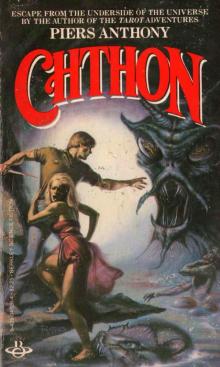 Chthon
Chthon Dragon on a Pedestal
Dragon on a Pedestal E. S. P. Worm
E. S. P. Worm Hope of Earth
Hope of Earth The Series Boxed Set
The Series Boxed Set Blue Adept
Blue Adept The Sopaths
The Sopaths Beetle Juice
Beetle Juice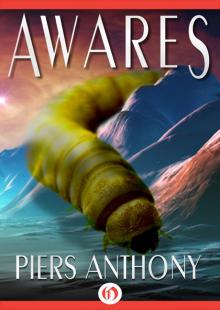 Awares
Awares Golem in the Gears
Golem in the Gears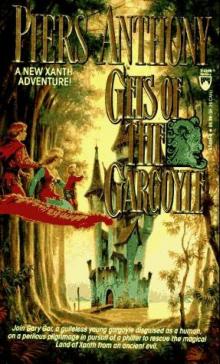 Geis of the Gargoyle
Geis of the Gargoyle Bamboo Bloodbath and Ninja's Revenge
Bamboo Bloodbath and Ninja's Revenge Heaven Cent
Heaven Cent Neq the Sword
Neq the Sword Pandora Park
Pandora Park Juxtaposition
Juxtaposition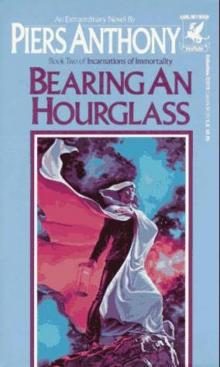 Bearing an Hourglass
Bearing an Hourglass Dragon Assassin
Dragon Assassin Board Stiff
Board Stiff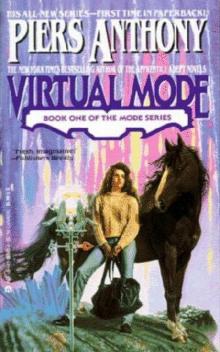 Virtual Mode
Virtual Mode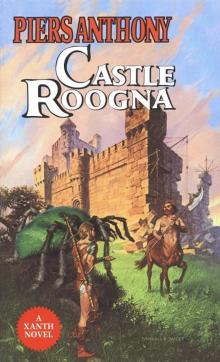 Castle Roogna
Castle Roogna Aliena Too
Aliena Too Pet Peeve
Pet Peeve The Metal Maiden Collection
The Metal Maiden Collection Volk
Volk Phaze Doubt
Phaze Doubt The Color of Her Panties
The Color of Her Panties Amazon Slaughter and Curse of the Ninja Piers Anthony
Amazon Slaughter and Curse of the Ninja Piers Anthony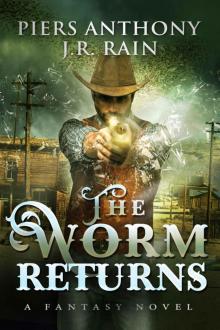 The Worm Returns
The Worm Returns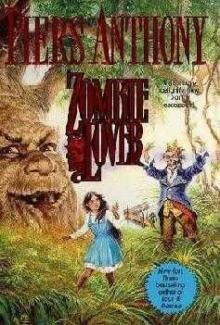 Zombie Lover
Zombie Lover Xone of Contention
Xone of Contention The Gutbucket Quest
The Gutbucket Quest Split Infinity
Split Infinity Dream a Little Dream: A Tale of Myth and Moonshine
Dream a Little Dream: A Tale of Myth and Moonshine Balook
Balook Out of Phaze
Out of Phaze The Secret of Spring
The Secret of Spring Mouvar's Magic
Mouvar's Magic Cube Route
Cube Route Mercenary
Mercenary Total Recall
Total Recall Man From Mundania
Man From Mundania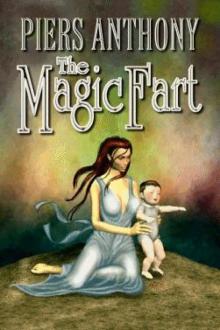 The Magic Fart
The Magic Fart Letters to Jenny
Letters to Jenny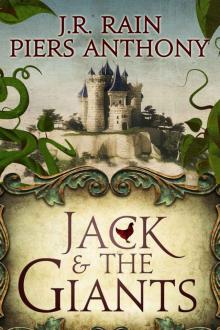 Jack and the Giants
Jack and the Giants Executive
Executive Robot Adept
Robot Adept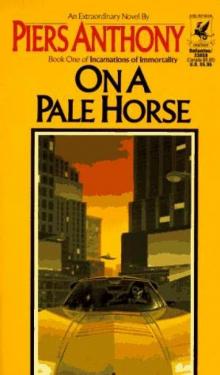 On A Pale Horse
On A Pale Horse Vale of the Vole
Vale of the Vole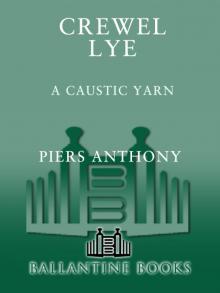 Crewel Lye
Crewel Lye For Love of Evil
For Love of Evil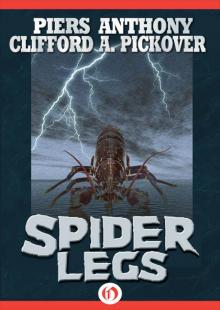 Spider Legs
Spider Legs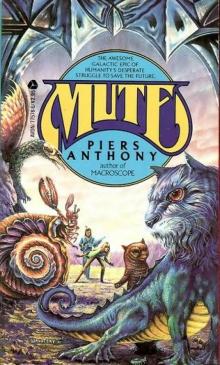 Mute
Mute Being a Green Mother
Being a Green Mother Hair Suite
Hair Suite Air Apparent
Air Apparent Politician
Politician Aliena
Aliena Phthor
Phthor Ghost Writer in the Sky
Ghost Writer in the Sky Pornucopia
Pornucopia Eroma
Eroma Shepherd
Shepherd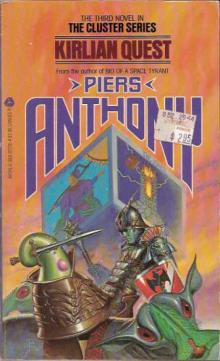 Kirlian Quest
Kirlian Quest Swell Foop
Swell Foop God of Tarot
God of Tarot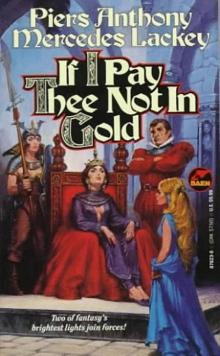 If I Pay Thee Not in Gold
If I Pay Thee Not in Gold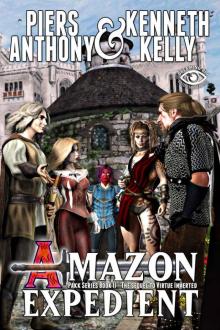 Amazon Expedient
Amazon Expedient Faun & Games
Faun & Games Vision of Tarot
Vision of Tarot Centaur Aisle
Centaur Aisle Serpent's Silver
Serpent's Silver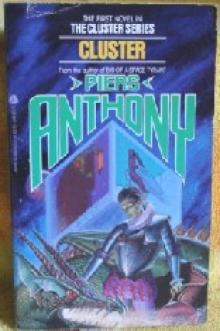 Cluster
Cluster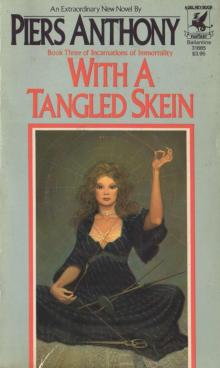 With a Tangled Skein
With a Tangled Skein Chaining the Lady
Chaining the Lady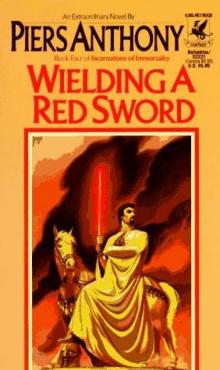 Wielding a Red Sword
Wielding a Red Sword Key to Chroma
Key to Chroma WereWoman
WereWoman Isis Orb
Isis Orb Hair Peace
Hair Peace Two to the Fifth
Two to the Fifth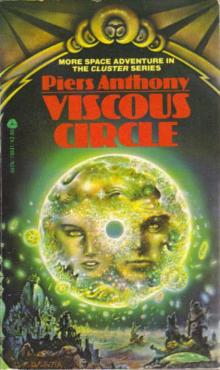 Viscous Circle
Viscous Circle Skeleton Key
Skeleton Key Cautionary Tales
Cautionary Tales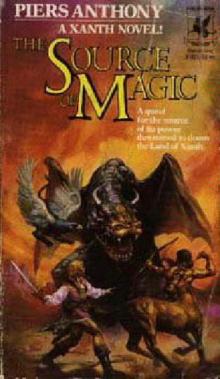 The Source of Magic
The Source of Magic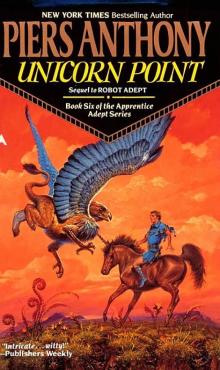 Unicorn Point
Unicorn Point Writer's Retweet
Writer's Retweet Demons Don't Dream
Demons Don't Dream Ogre, Ogre
Ogre, Ogre The Iron Maiden
The Iron Maiden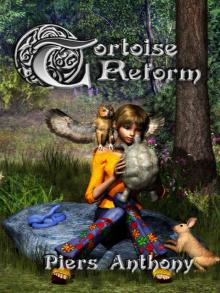 Tortoise Reform
Tortoise Reform Luck of the Draw
Luck of the Draw A Spell for Chameleon
A Spell for Chameleon Yon Ill Wind
Yon Ill Wind Currant Events
Currant Events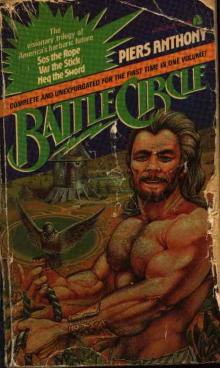 Var the Stick
Var the Stick And Eternity
And Eternity Kiai! & Mistress of Death
Kiai! & Mistress of Death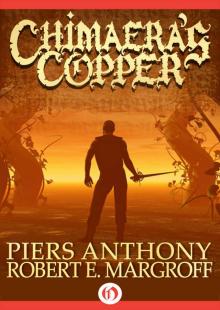 Chimaera's Copper
Chimaera's Copper Refugee
Refugee Isle of View
Isle of View Thousandstar
Thousandstar Mer-Cycle
Mer-Cycle Service Goat
Service Goat Five Portraits
Five Portraits Night Mare
Night Mare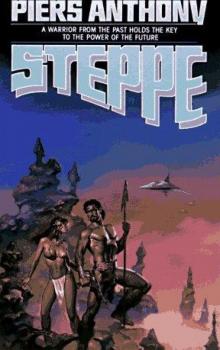 Steppe
Steppe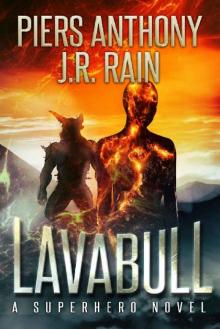 Lavabull
Lavabull Well-Tempered Clavicle
Well-Tempered Clavicle Aladdin Relighted
Aladdin Relighted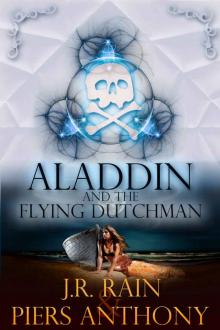 Aladdin and the Flying Dutchman
Aladdin and the Flying Dutchman Knot Gneiss
Knot Gneiss Roc and a Hard Place
Roc and a Hard Place Aladdin Sins Bad
Aladdin Sins Bad Flytrap
Flytrap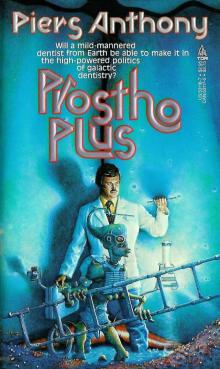 Prostho Plus
Prostho Plus Esrever Doom
Esrever Doom Hair Power
Hair Power The Journey
The Journey Virtue Inverted
Virtue Inverted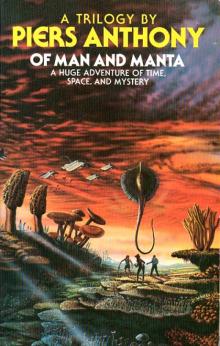 Of Man and Manta Omnibus
Of Man and Manta Omnibus Trail Mix: Amoeba
Trail Mix: Amoeba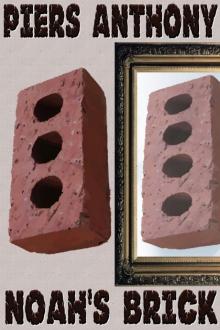 Noah's Brick
Noah's Brick Odd Exam
Odd Exam Magenta Salvation
Magenta Salvation Jest Right
Jest Right Fire Sail
Fire Sail Chthon a-1
Chthon a-1 Amoeba
Amoeba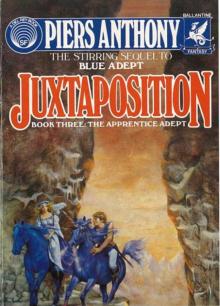 Juxtaposition aa-3
Juxtaposition aa-3 Pira
Pira THE CATERPILLARS QUESTION
THE CATERPILLARS QUESTION What Fears Become: An Anthology from The Horror Zine
What Fears Become: An Anthology from The Horror Zine Bio of a Space Tyrant Vol. 3. Politician
Bio of a Space Tyrant Vol. 3. Politician Ogre Ogre x-5
Ogre Ogre x-5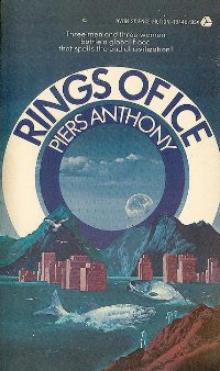 Rings of Ice
Rings of Ice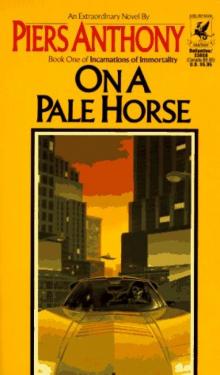 On a Pale Horse ioi-1
On a Pale Horse ioi-1 Luck of the Draw (Xanth)
Luck of the Draw (Xanth) Centaur Aisle x-4
Centaur Aisle x-4 Thousandstar (#4 of the Cluster series)
Thousandstar (#4 of the Cluster series) Gutbucket Quest
Gutbucket Quest Isle of Woman (Geodyssey)
Isle of Woman (Geodyssey) Chaining the Lady c-2
Chaining the Lady c-2 To Be a Woman
To Be a Woman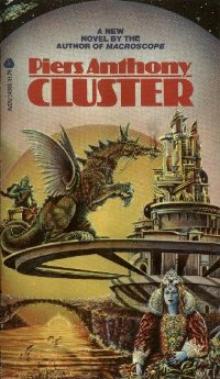 Cluster c-1
Cluster c-1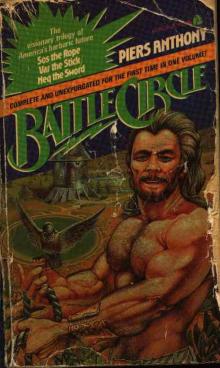 Battle Circle 2 - Var the Stick
Battle Circle 2 - Var the Stick Mercenary (Bio of a Space Tyrant Book 2)
Mercenary (Bio of a Space Tyrant Book 2)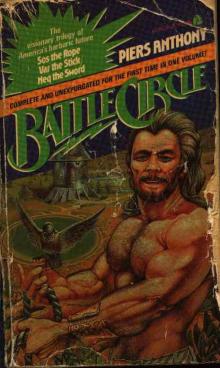 Battle Circle 1 - Sos the Rope
Battle Circle 1 - Sos the Rope Xanth 30 - Stork Naked
Xanth 30 - Stork Naked Secret of Spring
Secret of Spring Xanth 29 - Pet Peeve
Xanth 29 - Pet Peeve Serpents's Silver
Serpents's Silver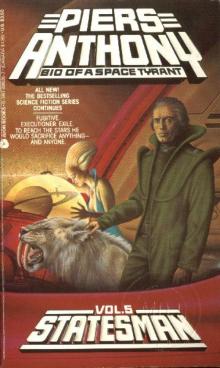 Statesman by Piers Anthony
Statesman by Piers Anthony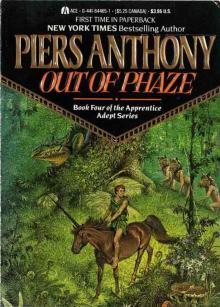 Out of Phaze aa-4
Out of Phaze aa-4 Amazon Slaughter & Curse of the Ninja
Amazon Slaughter & Curse of the Ninja